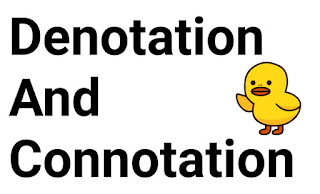DENOTATION AND CONNOTATION
Exercise 1
1. Shall we sit at the table?
2. I'm trying to give up chocolate.
3. I'm going to take my books to school.
4. He's really skinny. I think he may be ill.
5. This film is so boring.
The meaning of 'table' in number 1 above is 'a flat surface, usually supported by four legs, used for putting things on'. The meaning given in a dictionary is called the denotation (or sometimes the literal meaning). Literal meaning also refers to the original or basic meaning of a word or group of words. Sometimes the denotation of individual words is obvious as in 'table' in number 1 above, or 'take' in number 3.
At other times the denotation of a combination of words may be more difficult to understand as in 'give up' in number 2 above. In this example of a multiword verb (a verb plus an adverb/preposition particle), the separate denotations of 'give' and 'up' do not give the meaning of 'give up'. It is sometimes important to look at words in combination when understanding their meaning.
Look again at number 4 in Exercise 1. The denotation of the word 'skinny' is 'very thin' but it has an additional negative meaning: an idea that is suggested by the word. This is called the connotation. So, the full meaning of 'skinny' is 'very thin (denotation) in a bad way (connotation)'. Words or sets of words can have a negative, a positive or a neutral connotation. Some dictionaries provide information about connotations. For example, the Cambridge Advanced Learner's Dictionary says that skinny is 'MAINLY DISAPPROVING'. Sometimes it is the denotation itself that has a negtive meaning, for example 'boring' in number 5 in Exercise 1.
Exercise 2
1. In business reports, it's common to use tables and graphs.
2. I gave up ice cream last year and feel so much healthier.
3. I usually take the bus to work.
4. He's as skinny as he was when he was 16. He looks great!
In English, many words can be used with different meanings. Some words (e.g. table) can change their meaning because they are used for different things. Some can 'lose' their meaning. For example, 'take' has a denotation of 'move from one place to another' but in number 3 in Exercise 2, it has lost this meaning without gaining another. This is because it is part of the collocation 'take a bus', i.e. the words 'take' and 'bus' regularly go together and the meaning of 'take' cannot be separated from 'bus'. Verbs that 'lose' their meaning in this way are called delexicalised verbs. Another example is 'have' in 'I have a shower every morning' (which doesn't mean possess or own a shower).
Look again at number 4 in Exercise 1. The denotation of the word 'skinny' is 'very thin' but it has an additional negative meaning: an idea that is suggested by the word. This is called the connotation. So, the full meaning of 'skinny' is 'very thin (denotation) in a bad way (connotation)'. Words or sets of words can have a negative, a positive or a neutral connotation. Some dictionaries provide information about connotations. For example, the Cambridge Advanced Learner's Dictionary says that skinny is 'MAINLY DISAPPROVING'. Sometimes it is the denotation itself that has a negtive meaning, for example 'boring' in number 5 in Exercise 1.
Exercise 2
1. In business reports, it's common to use tables and graphs.
2. I gave up ice cream last year and feel so much healthier.
3. I usually take the bus to work.
4. He's as skinny as he was when he was 16. He looks great!
In English, many words can be used with different meanings. Some words (e.g. table) can change their meaning because they are used for different things. Some can 'lose' their meaning. For example, 'take' has a denotation of 'move from one place to another' but in number 3 in Exercise 2, it has lost this meaning without gaining another. This is because it is part of the collocation 'take a bus', i.e. the words 'take' and 'bus' regularly go together and the meaning of 'take' cannot be separated from 'bus'. Verbs that 'lose' their meaning in this way are called delexicalised verbs. Another example is 'have' in 'I have a shower every morning' (which doesn't mean possess or own a shower).
The connotation of a word can also change according to the situation or the context it is used in or the person using it. For example, in number 4 above, although 'skinny' often has a negative connotation, the speaker is using it in a positive way. When using lexis it is important to make sure you understand the denotation, the generally accepted connotation and also the specific connotation in the context in which it is being used.


Welldone
ReplyDeleteThank you..
DeleteThat was very helpful
ReplyDeleteThank you.. :)
DeleteThank you..
ReplyDelete